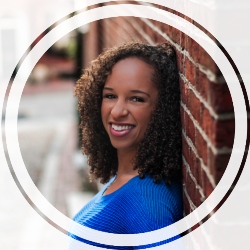How I Decided I Was Important Enough to Speak Out
When I felt compelled to speak up and speak out, I had to confront that judgmental voice inside my head and get out of my own way.
Anyone who knows me well knows that I have strong opinions. I think of myself as a curious person who often uses creative outlets to try to better understand and process what’s going on around me. And I’ve got a strong sense of what’s right and what’s wrong. But when it came to “speaking out,” I used to, mostly, opt out.
Whether I had a strong opinion or an experience to share, there were so many reasons why my voice was a whisper instead of a rallying cry. Why would people care what I had to say? How could I make any kind of difference? I was not an authority figure on any given subject. And I’d often feel it was egotistical to think that what I had to say was important.
In short, though I didn’t realize it, I was negating the power of my own voice before I could even speak.
All my life, I’ve confused “confidence” with being “egotistical” or being “too much.” It’s a trope that burdens many women, and especially women of color. When we assert ourselves and exhibit confidence, we’re slapped with any number of labels. Difficult. Angry. Aggressive. Too much. Even if no one says those words out loud, many of us fear these ingrained stereotypes. I’ve always been afraid of being “too much” or “too loud” or really, “too anything.” So I’ve often heavily edited myself before speaking out in any real way, or I’ve just refrained from saying anything at all, thinking that other, better, more qualified people would speak out instead.
But after the murder of George Floyd, in the throws of the Trump presidency and a global pandemic, my blood was boiling every single day. There were so many points that weren’t getting across regarding Black Lives Matter and racial justice. So many people seemed to be misunderstanding. I’d often find myself in a social media scroll (or doom scroll) session, looking for someone who was making the points that were in my head. But instead, I’d find backwards logic from “All Lives Matter” people on my News Feed that just enraged me.
Finally, one day, it just hit me. If I had something to say, why wasn’t I saying it? What was I so afraid of? Offending those people who were offending me without a second thought? Showing people that I wasn’t as agreeable as they had assumed? And why should I fear losing people who didn’t like me speaking my mind? People who would rather keep me as small as I had been keeping myself?
I really had to sit with those feelings and with that voice inside of me that resisted speaking up. At the end of the day, I think not speaking up stemmed from the feeling that I wasn’t important enough to speak. And I was afraid of offending others with my words, or making waves in any way. Sure, this kind of thinking was a product of my conditioning as a biracial person and as a woman. But at the end of the day, I had to come to terms with the fact that I was the one who was silencing and stifling myself.
I don’t actually know what it was that pushed me over the edge, but I finally gathered my thoughts about racism, and its effects on my life, and wrote them down on my Facebook page. I finally convinced myself that it didn’t matter that I had never been “political” on social media before. It didn’t matter that I’d held onto my opinions in the past to make other people more comfortable with me. I realized that I was allowed to change, and I didn’t have to ask for anyone’s permission. And though it felt uncomfortable, I knew there was only one way forward. I had to lean into these new revelations and grow. I had to trust myself and really believe that my voice was valuable enough to be spoken and heard. I had to jump.
So I pressed the ‘Post’ button, closed the computer, and went for a walk. My heart was pounding and my stomach was in knots. The discomfort that was coming up surprised even me. But when I finally made my way back to the comments, the support overwhelmed me. Suddenly, the faceless critics in my mind didn’t seem to matter.
Speaking out on that one occasion felt like jumping out of a plane; scary, thrilling, and spontaneous. But deciding to speak up on a normal basis was like learning a new instrument or working on a difficult new skill. I’m continually fighting that voice in my head that tells me I’m not important enough or that my stories don’t matter. But now, I’m talking back to those rude voices, and the uncomfortable feelings that keep coming up, and I’m speaking up anyway. The more I do it, the more I believe I have a right to do it.
Now that I’m speaking directly to you from my own blog (something I never thought would exist), I want to point out the things I noticed that happened when I started using my voice and stopped saying “no” to myself.
1. People Wanted to Hear What I Had to Say
People cared. People were listening. People wanted to hear more. And that forced me to think about why that was. I started to see the value in my unique experiences. I realized that though I struggled with feeling like an authority on any topic, I was the only authority on my own opinion.
Once I actually put my thoughts out there, there were people in my life who were eager to support me. They just had to see that there was something to support first.
2. I Started Hearing Other People’s Stories
I noticed that there were people who were reading my stories and feeling like they could exhale. Bravery breeds bravery. And when other people see that it’s safe to come out with their experiences, they’ll share theirs as well.
I remember when I was struggling as a new mom, all I seemed to see (on social media and in real life) were happy and well-adjusted moms who appeared to have it all together. That wasn’t my experience at all. When I finally did speak up about some of my struggles (around my son’s first birthday), the response knocked me out. There were moms everywhere who could relate. They just didn’t feel they had the space to talk about it.
Just by sharing my story, I went from feeling alone to feeling completely surrounded by support, understanding and love. And I soaked up those other stories like lifelines.
3. I Started To Trust Myself More
Once I realized that I had a valuable opinion, I stopped looking for other opinions to validate the way I was thinking. I started trusting in myself to know what was right.
I’m working hard on quitting the “someone else must know better than me” mindset. It’s hard to recondition yourself into fully owning your power.
Michelle Obama has a quote that has stuck with me since I heard it:
“I have been at probably every powerful table that you can think of, I have worked at nonprofits, I have been at foundations, I have worked in corporations, served on corporate boards, I have been at G-summits, I have sat in at the U.N.: They are not that smart.”
People feel empowered to speak up for a variety of reasons. They are not necessarily speaking their mind because they know better than anyone else. Their voice may be louder because they don’t hear that inner voice telling them that they don’t belong, or that they aren’t worthy of being an authority.
Michelle discovered that even the “most qualified” voices at any given table were not necessarily smarter than her. But she still struggled with feeling as though her voice was valuable.
I have so struggled with feeling empowered enough to speak up and speak out. I’ve let louder people talk me down. I’ve given into others who share their opinions easily and more freely. I’ve kept my opinions to myself for fear of making waves or creating an uncomfortable environment.
But once I started practicing using my voice more, I started trusting in that voice more. I began to internalize the idea that I was just as qualified to use my voice as anyone else, especially when I had related personal experiences.
4. I Had More to Say Than I Realized
When I first started a blog, I was terrified at the thought of coming up with regular content. I wasn’t sure if I’d regularly have something to say. Well, it turns out that I have a lot more to say and share than I ever thought possible. Once I started digging into the wells of my own experiences, I realized that I was the one who was pushing them down, not deeming them important enough to resurface, share or discuss.
Once I started saying “yes, and” to myself instead of “no”, the content just started flowing. The problem went from worrying about whether or not I should speak up to figuring out what I should speak up about first.
5. I Started Pushing Back Against Ingrained Thoughts
Once I was able to identify the reasons why it took me so long to muster my voice and to forcefully use it, I had to confront those beasts that held me back.
I needed to stop caring about being good or being liked, or fitting into any given box. I needed to care more about being myself (since I’m the one who has to live with me forever). And I’ve learned that being fully myself means speaking up and speaking out, and trusting in the strength, and value, of my own voice.
I’ve learned that it’s crucial to regularly tell myself that I’m important and that my voice matters. And that has opened the flood gates to a whole new way of living.

